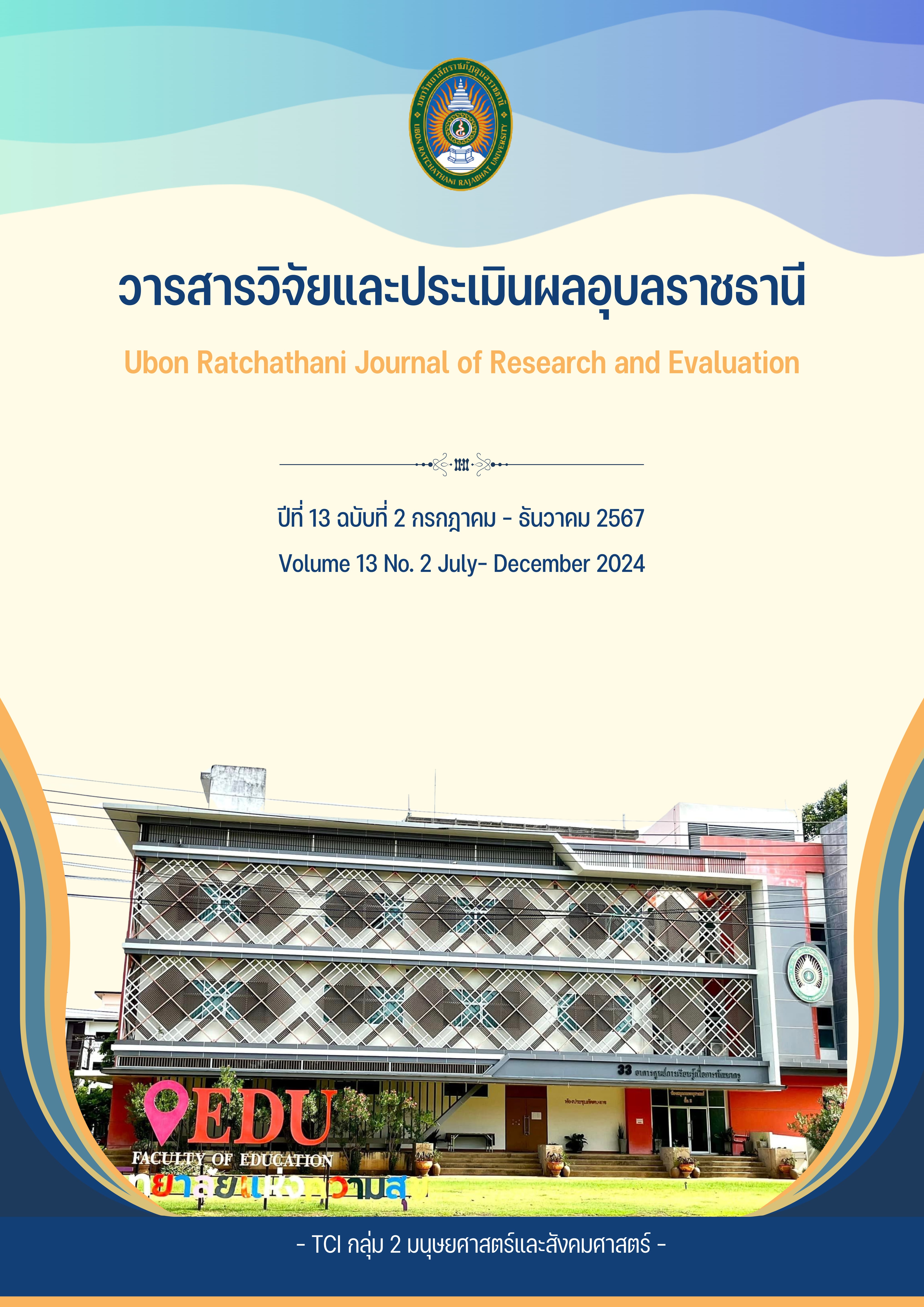The Develop a Package to Practice Analytical Thinking Skills in Basic Economics Subjects for First Year Students, Southern College of Finance. People's Democratic Republic of Laos.
Analytical Thinking, a Package to Practice, Basic Economics Subjects
Abstract
The purposes of this research were to 1) develop a practice package for analytical thinking skills in basic economics subjects for first year associate degree students, Southern College of Finance, Pakse, Lao People's Democratic Republic; and 2) investigate the result of using the practice package for analytical thinking skills in basic economics subjects and compare the thinking skills within the experimental group and between the experimental and the control groups. The samples of the study were 30 first year associate degree students in the academic year 2022 at Southern College of Finance, Pakse, Lao People's Democratic Republic, selected on a voluntary basis, randomly and equally assigned to the experimental and the control groups. The research instrument was a test on the analytical thinking skills in basic economics subjects. The data were analyzed using descriptive statistics and t-test.
The research findings were as follows:
- 1. The practice package for analytical thinking skills in basic economics subjects for first year associate degree students, Southern College of Finance, Pakse, Lao People's Democratic Republic has three aspects of learning outcomes: content analysis; relation analysis and principles analysis, all of which consisted of 5 steps, namely: 1) questioning, 2) investigating and researching information, 3) making a summary of body of knowledge, 4) presentation of knowledge and 5) application of knowledge. These constituted 3 learning units which were evaluated and the mean score was appropriate at a high level.
- Analytical thinking skills in basic economics subjects of experimental group after experimental were significantly different statistically at the .01 level.
- Analytical thinking skills in basic economics subjects to experimental and control groups. Differences are statistically significant at the .01 level.
References
เอกสารอ้างอิง
กระทรวงศึกษาธิการ และกีฬา. วิสัยทัศน์ถึงปี 2030 ยุทธศาสตร์ถึงปี 2025 และแผนพัฒนาภาคการศึกษาและกีฬา 5 ปี ครั้งที่ VIII (2016-2020). นะคอนหลวงเวียงจัน: กระทรวงศึกษาธิการและกีฬา, 2558.
กระทรวงศึกษาธิการ. หลักสูตรแกนกลางการศึกษาขั้นพื้นฐาน พุทธศักราช 2551. กรุงเทพฯ, 2551.
จุฑารัตน์ พันธุ. การพัฒนาการคิดวิเคราะห์โดยกระบวนการคิดวิเคราะห์ 5W1H สำหรับ นักเรียนชั้นมัธยมศึกษาปีที่ 6 โรงเรียนดอนเมืองทหาร อากาศบำรุง ในรายวิชาโลจิสติกส์. สาขาธุรกิจและคอมพิวเตอร์ศึกษา: มหาวิทยาลัยเกษตรศาสตร์, 2556.
ทิศนา แขมมณี และคณะ. วิทยาการด้านการคิด. กรุงเทพมหานคร: สถาบันพัฒนาคุณภาพวิชาการ, 2544.
ธัญญารัตน์ สุขเกษม. ผลการจัดการเรียนรู้แบบกระบวนการเรียนรู้ 5 ขั้นตอน (5 STEPs) ร่วมกับการใช้คำถามเชิงวิเคราะห์ เรื่องวิวัฒนาการที่มีต่อการคิดวิเคราะห์ทางวิทยาศาสตร์ และผลสัมฤทธิ์ทางการเรียน ของนักเรียนชั้นมัธยมศึกษาปีที่ 4. คณะศึกษาศาสตร์ มหาวิทยาลัยบูรพา. ศึกษาศาสตร์สารมหาวิทยาลัยเชียงใหม่, 3 :2 (พฤษภาคม-สิงหาคม 2562), 24-36.
ประภาทิพย์ ภูนคร. ผลของการใช้เทคนิค Five-step model ที่มีต่อทักษะการคิดอย่างมีวิจารณญาณของนักเรียนประถมศึกษาปีที่ 5. ครุศาสตรมหาบัณฑิต สาขาวิชาจิตวิทยาการศึกษา ภาควิชาวิจัยและจิตวิทยาการศึกษา คณะครุศาสตร์ จุฬาลงกรณ์มหาวิทยาลัย, 2555.
พีรวุฒิ ยิ่งนอก. การศึกษาผลสัมฤทธิ์ทางการเรียน และการคิดวิเคราะห์ โดยการจัดกิจกรรมการเรียนรู้ด้วยกระบวนการเรียนรู้ 5 ขั้นตอน (5 STEPs) ร่วมกับการจัดการเรียนรู้แบบร่วมมือด้วยเทคนิค STAD เรื่องทรัพยากรธรณี ของนักเรียนชั้นมัธยมศึกษาปีที่ 4. วรสารศึกษาศาสตร์ มมร. คณะศึกษาศาสตร์ มหาวิทยาลัยมหามกุฏราชวิทยาลัย. 11: 1 (มกราคม - มิถุนายน 2566): 55-63.
เพ็ญผกา มณีเพ็ชร. การพัฒนาชุดกิจกรรมการเรียนรู้วิทยาศาสตร์ โดยใช้กระบวนการเรียนรู้ 5 ขั้นตอน (5 STEPs) เรื่องการเปลี่ยนแปลงของสาร ของนักเรียนชั้นประถมศึกษาปีที่ 5 โรงเรียนบ้านแม่ออกเหนือ สำนักงานเขตพื้นที่การศึกษาประถมศึกษาแม่ฮ่องสอน เขต 2. ศึกษาศาสตรมหาบัณฑิต สาขาวิชาหลักสูตรและการสอน คณะศึกษาศาสตร์ วิทยาลัยนอร์ทเทิร์น, 2563.
อารีย์ ทองเพ็ง. ผลการจัดการเรียนการสอนด้วยวิธี SQ6R ร่วมกับเทคนิค KWL ที่มีต่อความสามารถในการคิดวิเคราะห์ ความเข้าใจในการอ่าน และผลสัมฤทธิ์ทางการเรียนภาษาอังกฤษของนักเรียนชั้นมัธยมศึกษาปีที่ 3. วิทยานิพนธ์ปริญญามหาบัณฑิต สาขาวิชาหลักสูตรและวิธีสอน มหาวิทยาลัยทักษิณ, 2556.
Bloom, B. S. Taxonomy of Education Objective Handbook I: Cognitive Domain. New York: David Mc Kay Company, 1956.
Bloom, Benjamin S. Taxonomy of Education Objective, Handbook I : Cognitive. Domain. NewYork : David Mckay. Cook, T.D. and T. Donald Campbell, 1976.
Edmonds, W. A., & Kennedy, T. D. An Applied Reference Guide to ResearchDesigns: Quantitative, Qualitative, and Mixed Methods. London: Sage, 2013.
Hobbs, R. Digital and Media Literacy: A Plan of Action. Washington, D.C. The Aspen Institute. Retrieved April 7, 2021, From http://www.aspeninstitute.org/events/2010/11/10/digital-media-literacy-plan-action, 2010.
Limbach, B., Duron, R., and Waugh, W. Critical Thinking Framework for Any Discipline. International Journal of Teaching and Learning in Higher Education. Vol. 17, No. 1, 2006.
Downloads
Published
How to Cite
Issue
Section
License
Copyright (c) 2024 Ubon Ratchathani Journal of Research and Evaluation

This work is licensed under a Creative Commons Attribution-NonCommercial-NoDerivatives 4.0 International License.
1. บทความที่ตีพิมพ์ในวารสารนี้ได้มีการตรวจสอบการลอกเลียนงานวรรณกรรมแล้ว ไม่เกินร้อยละ 25
2. บทความที่ตีพิมพ์ในวารสารนี้เป็นข้อคิดเห็น ข้อค้นพบของผู้เขียนบทความ โดยผู้เขียนบทความต้องเป็นผู้รับผิดชอบต่อผลทางกฎหมายใด ๆ ที่อาจเกิดขึ้นจากบทความนั้น ๆ
3. บทความ ข้อมูล เนื้อหา รูปภาพ ฯลฯ ที่ได้รับการตีพิมพ์ในวารสารวิจัยและประเมินผลอุบลราชธานี ถือเป็นลิขสิทธิ์ของวารสารวิจัยและประเมินผลอุบลราชธานี หากบุคคลหรือหน่วยงานใดต้องการนำทั้งหมดไปเผยแพร่ต่อหรือเพื่อกระทำการใดๆ จะต้องได้รับอนุญาตเป็นลายลักษณ์อักษรจากวารสารวิจัยและประเมินผลอุบลราชธานีก่อนเท่านั้น และจะต้องมีการอ้างอิงวารสารวิจัยและประเมินผลอุบลราชธานี ฉบับนั้น ๆ ด้วย






